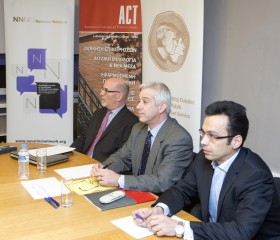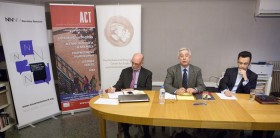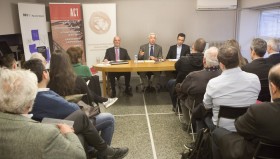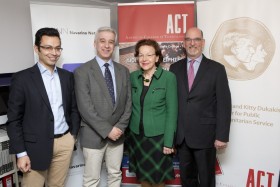
Dukakis Center hosts distinguished Greek expert in Greek-Turkish relations
Kostas Ifantis delivers Dukakis Lecture
The Dukakis Center hosted a public lecture by Professor Konstas Ifantis, of Panteion and Kadir Has Universities, with Sotiris Serbos (Democritus University) and Paroula Perraki (University of Macedonia) as discussants, while Dr. David Wisner (American College of Thessaloniki) moderated the discussion. The lecture took place on the premises of the NAvarino Network, who co-hosted the event along with the Kaliopi Koufa Foundation.
The lecture addressed a wide range of contemporary issues involving Greco-Turkish relationships during an era of political uncertainty. It was pointed out that in 1999 Abdullah Ocalan, the leader of the Workers Party in Kurdistan, was leaving the Greek Embassy when he was captured by Turkish agents. Three Greek Ministers had to resign in order to avoid Turkish aggression. However, since 1999 a new era has begun in the relationship between Greece and Turkey, an era of a controlled crisis through political consultations regarding Aegean Issues and confidence-building measures. Commercial and economic relations with Greece have also gained strength while developments have been made in bilateral political relations.
Professor Ifantis mentioned that Greece’s balance of trade with Turkey is positive, while it is negative to all other countries. Therefore, Greece enjoys a trade surplus only with Turkey, as it is exporting more than it is importing just with that one country. We realize that a healthy Turkish economy is only beneficial for Greece, as Greece is able to take advantage of it thanks to its proximity. Tourism is one of the promising fields of cooperation between two countries. As mentioned by the Turkish Ministry of Foreign Affairs, every year, and almost one million tourists each from Turkey and Greece visit each other’s country. Additionally, the stock of direct Turkish investments in Greece amount to approximately 500 million USD. Turkish investors mostly focus on investing in marinas, ports and the overall tourism sector in Greece. Furthermore, a Turkish bank has branches in Athens and cities in the vicinity of Turkish borders.
In her commentary, Professor Perraki sparked the conversation with questions that were definitely on the minds of the audience; she remarked that Turkey continued to systematically disregard Greek national sovereign territory by violating air and sea borders. Indeed, Turkey contested ‘Greece’s legal right, on threat of war (casus belli), to extend its territorial sea to 12 nautical miles, as provided for by the Law of the Sea’, ‘disputed the extent of Greek national airspace, through constant violations by Turkish fighter aircraft’ and
‘contested Greek sovereignty over islands (theretofore unheard-of grey zones theory) and violation of that sovereignty even in cases of inhabited islands’.[1] The Greek government boarded complaints with NATO, the EU and the UN over this crisis.
Professor Ifantis concluded with the remark that we can be optimistic about the future, despite the crisis in the Aegean. He mentions that although the Turkish government does not fully trust the Ministry of Foreign Affairs and is greatly relied on secret services, it would be very doubtful that true gain would be found in a Greco-Turkish conflict, only cost.
The author of the text is Maria Kalogeroudi, IB 2011. ACT 2015.
Further reading
http://www.mfa.gov.tr/relations-between-turkey-and-greece.en.mfa
http://www.mfa.gr/el/issues-of-greek-turkish-relations/
[1] Ministry of Foreign Affairs. (2016). http://www.mfa.gr/el/issues-of-greek-turkish-relations/. [online] Available at: http://www.mfa.gr/el/issues-of-greek-turkish-relations/ [Accessed 29 Mar. 2016].



